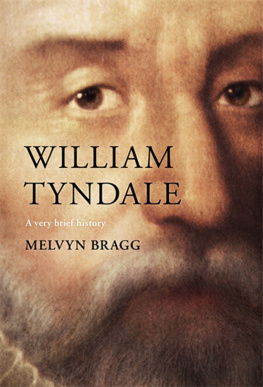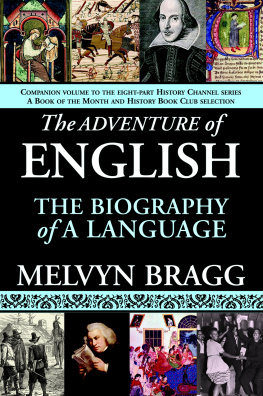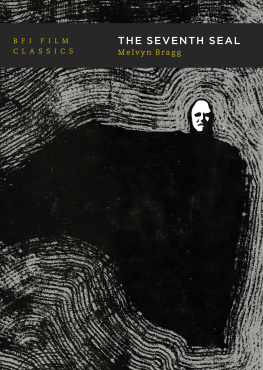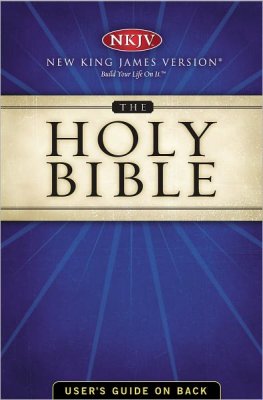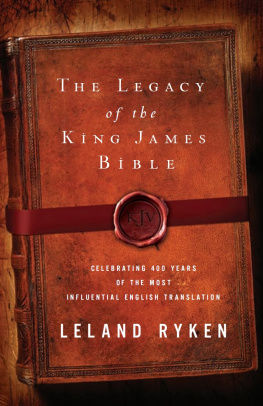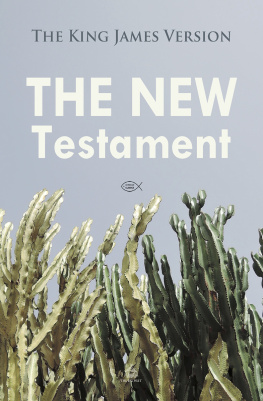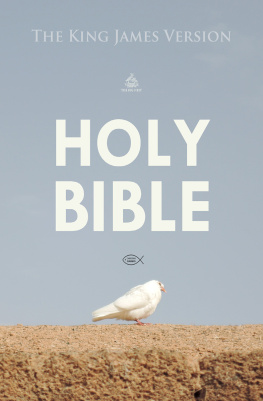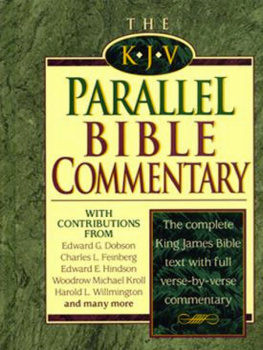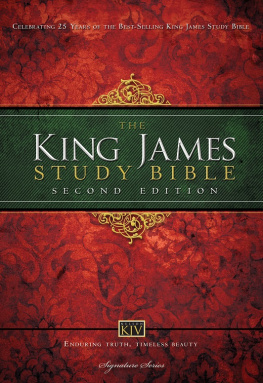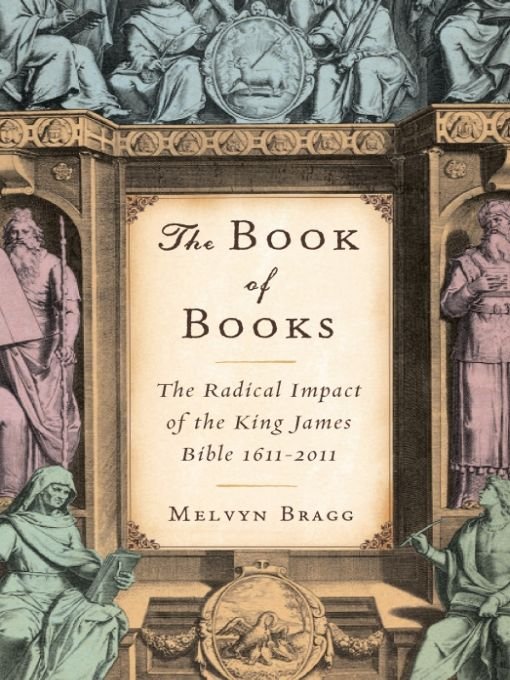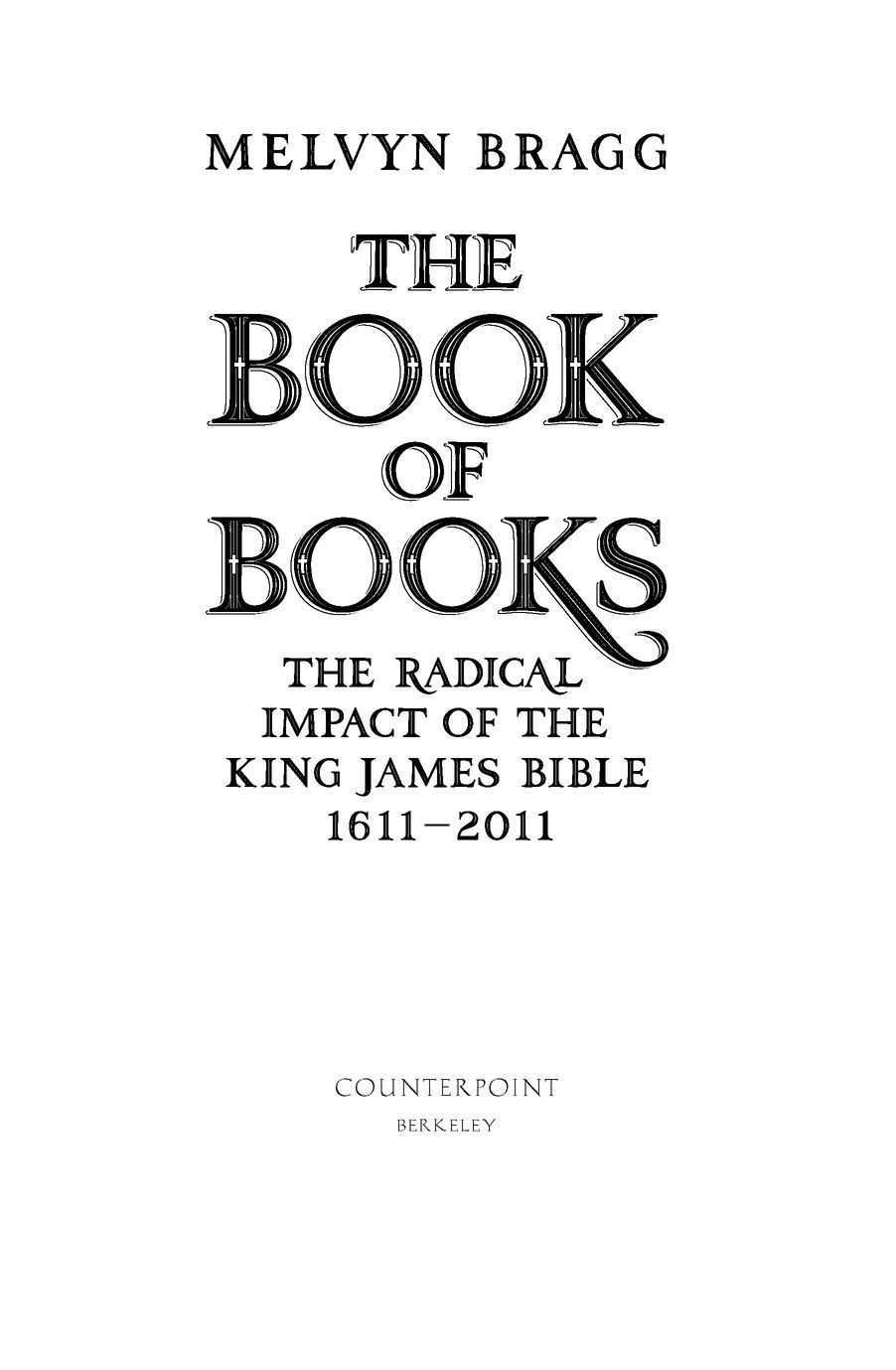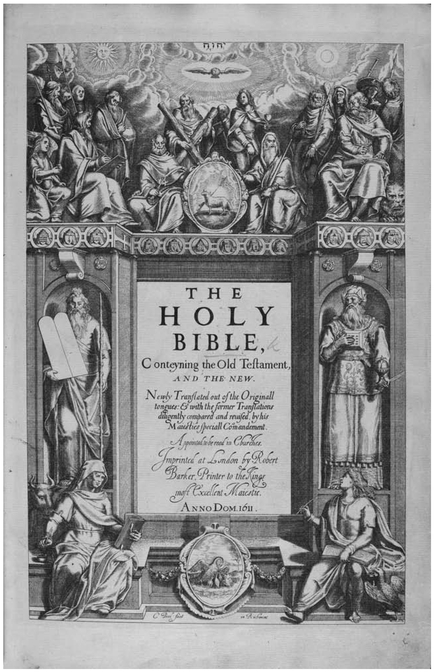Table of Contents
Also by Melvyn Bragg:
Fiction
For Want of a Nail
The Second Inheritance
The Cumbrian Trilogy:
The Hired Man
A Place in England
Kingdom Come
The Nerve
Without a City Wall
The Silken Net
Autumn Manoeuvres
Love and Glory
Josh Lawton
The Maid of Buttermore
A Christmas Child
A Time to Dance
A Time to Dance: the screenplay
Crystal Rooms
Credo
The Soldiers Return
A Son of War
Crossing the Lines
Remember Me
Non-fiction
Speak for England
Land of the Lakes
Laurence Olivier
Cumbria in Verse (edited)
Rich: The Life of Richard Burton
On Giants Shoulders
The Adventure of English
12 Books that Changed the World
In Our Time
The South Bank Show: Final Cut
To the Reverend Marie-Elsa Bragg With love
PROLOGUE
In 1953, Queen Elizabeth II was crowned in Westminster Abbey. She swore her oath on the King James Bible. This version of the Bible was printed in English in 1611. It was inspired by James I, who was also crowned in Westminster Abbey, 350 years before Elizabeth II. His cousin, Elizabeth I, had, on the last day of her life, indicated that he was to be her successor.
The Bible was a book which changed and moulded the English-speaking peoples. In America, Abraham Lincoln was sworn in as President on the King James Version as were other Presidents including George Washington, Ronald Reagan and Barack Obama.
This is no mere ceremonial token either in the United Kingdom or in the United States, Australia, Canada, New Zealand and elsewhere. This binding ritual signifies and honours a bond of faith and an acknowledgement of the unique reach and power of this book.
You may be a Christian. You may be anti-Christian, or of another religion, or none. You may be an atheist fundamentalist and think the Bible is monstrous, a book to be dismissed or derided.
But whoever you are in the English-speaking world, I hope to persuade you to consider that the King James Version of the Bible has driven the making of that world over the last 400 years, often in most unexpected ways.
PART ONE
FROM HAMPTON COURT TO NEW ENGLAND
CHAPTER ONE
THE SCOPE OF IT
The King James Bible has been called the Book of Books. It has a good claim to this title. It consists of sixty-six different books. It has sold more than any other single book since its publication in 1611. It has carried the Protestant faith around the globe. And, by the law of unexpected consequences, its impact, alongside and often outside its vital role in spreading the Word, has been radical and amazingly wide-ranging. This Bible is one of the fundamental makers of the modern world. It has set free not only its readers and its preachers but those who have used it as a springboard to achieve gains and enrichment in our world never before enjoyed by so many. This book walks with us in our life today.
Its impact on the English-speaking world is unparalleled. It can touch on mysteries which seem beyond our reach yet at times we sense them to be there. It can teach us day-to-day morality. It gave us myths and stories which are as familiar to us as the histories of our own families and communities. It stands still as a book of great language and beauty.
There has never been a book to match it. It has a fair claim to be the most pivotal book ever written, a claim made by poets and statesmen and supported by tens of millions of readers and congregations. It declared itself to be the Word of God. Many people have believed and cleaved to that and some still do. But everyone, even atheists, has benefited from many of its unexpected consequences.
The King James Bible was the steel of will and belief that forged America and other British colonies. It has inspired missionaries around the globe and consoled the hopeless in their desperation. It was used by the enforcers of slavery and later by the liberators of slaves, and transformed into liberation theology by the slaves themselves. It became the bedding of gospel music and the spirituals which set in motion soul, blues, jazz and rock, the unique cultural gift of America to the world. It has defined and re-defined sexual attitudes. It has fortified and provoked philosophy.
Followers of the King James Version as it is known in America provided the vocabulary, the seedbed and construction model for the early development of democracy. It was the consolidating voice of two world empires. It unleashed and motivated philanthropic movements of a size and effectiveness which bettered the lives of ordinary people throughout the English-speaking world. Its ferocious sense of mission transformed and sometimes destroyed native cultures.
For centuries the King James Bible fed some of the finest thinkers and artists and men of science and politics; others it persecuted. This English version came out of persistent demands for a voice in their own tongue, a demand which, despite persecution, could not be extinguished in medieval England. It had grown into an irresistible force by the time of Henry VIII in the 1530s. The lasting version was finally secured by King James in 1611.
It was wonderful to see with what joy the Book of God was received, wrote a commentator at the time of its publication... not only among the learneder sort... but generally all England over among all the vulgar and common people; with what greediness Gods word was read... Some got others to read it to them if they could not themselves... even little boys flocked among the rest to hear portions of the Holy Scriptures read. In their own tongue: that was the first and still the most radical part of its impact.
Since 1611 it has flooded over the world. It is the best book that God has given to man, said Abraham Lincoln. Charles Dickens wrote: The New Testament is the very best book that ever was or ever will be known in the world. It is impossible rightly to govern the world without God and the Bible, said George Washington, the founding President of the United States.
This is a story of the present every bit as much as it is of the past. When American soldiers in Iraq and Afghanistan looked through the sights on their guns, they may not have seen it, but inscribed minutely there are words justifying war taken from the King James Bible. John viii, 12 for example: he that followeth me shall not walk in darkness, but shall have the light of life, and 2 Corinthians iv, 6: For God, who commanded the light to shine out of darkness, hath shined in our hearts, to give the light of the knowledge of the glory of God in the face of Jesus Christ.
When the Nobel-prize-winning novelist Toni Morrison wrote
Beloved, she called on that Bible again and again, bringing to bear its spirit and its words, her inspiration and her material. Behind the gallant, desperate and often flawed attempts to feed the poor of the world and release them from their oppression stands the most magnificent morality in print the Sermon on the Mount from the King James Bible. In verses called the Beatitudes:
Blessed are the poor in spirit: for theirs is the kingdom of heaven... Blessed are the peacemakers: for they shall be called the children of God.


